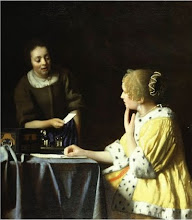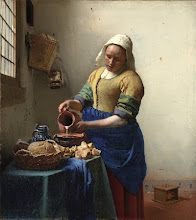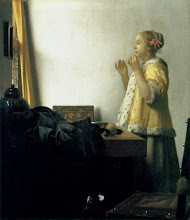How I Met My Wife By Jack Winter, Published July 25, 1994 in The New Yorker
It had been a rough day, so when I walked into the party I was very chalant, despite my efforts to appear gruntled and consolate.
I was furling my wieldy umbrella for the coat check when I saw her standing alone in a corner. She was a descript person, a woman in a state of total array. Her hair was kempt, her clothing shevelled, and she moved in a gainly way. I wanted desperately to meet her, but I knew I’d have to make bones about it since I was travelling cognito.
Beknownst to me, the hostess, whom I could see both hide and hair of, was very proper, so it would be skin off my nose if anything bad happened. And even though I had only swerving loyalty to her, my manners couldn’t be peccable.
Only toward and heard-of behaviour would do. Fortunately, the embarrassment that my maculate appearance might cause was evitable. There were two ways about it, but the chances that someone as flappable as I would be ept enough to become persona grata or a sung hero were slim.
I was, after all, something to sneeze at, someone you could easily hold a candle to, someone who usually aroused bridled passion. So I decided not to risk it.
But then, all at once, for some apparent reason, she looked in my direction and smiled in a way that I could make heads and tails of. I was plussed. It was concerting to see that she was communicado, and it nerved me that she was interested in a pareil like me, sight seen.
Normally, I had a domitable spirit, but, being corrigible, I felt capacitated as if this were something I was great shakes at, and forgot that I had succeeded in situations like this only a told number of times.
So, after a terminable delay, I acted with mitigated gall and made my way through the ruly crowd with strong givings. Nevertheless, since this was all new hat to me and I had no time to prepare a promptu speech, I was petuous.
Wanting to make only called-for remarks, I started talking about the hors d’oeuvres, trying to abuse her of the notion that I was sipid, and perhaps even bunk a few myths about myself. She responded well, and I was mayed that she considered me a savoury character who was up to some good. She told me who she was. “What a perfect nomer,” I said advertently.
The conversation became more and more choate, and we spoke at length to much avail. But I was defatigable, so I had to leave at a godly hour. I asked if she wanted to come with me. To my delight, she was committal.
We left the party together and have been together ever since. I have given her my love, and she has requited it.
Enjoy!
~Jane~
Friday, July 31, 2009
Thursday, July 30, 2009
Devonshire and Sensibility
I have been wondering for quite awhile about setting and mood; how stories can be set in the same place, yet have a completely different mood because of the way it's described and the personality of the character describing it. In particular I am looking at Sense and Sensibility by Jane Austen and The Hound of the Baskervilles by Arthur Conan Doyle. Both are set in Devonshire, modern day Devon County, England. Barton Cottage in Sense and Sensibility is within four miles north of Exeter, and Baskerville Hall is somewhere in Dartmoor, ten miles west of Exeter.
I have two very different descriptions of Devonshire here, which I’ve color coded so you can see how they describe the same thing using different words.
Here is how Edward Ferrars, one of the heroes of Jane Austen’s novel, describes the country surrounding Barton Cottage;
And here is a description by Dr. Watson of Sir Arthur Conan Doyle’s book;
While I do realize that Baskerville Hall is on the moor, which could drastically change the terrain, I wonder if the time period a book is written has more to do with it.
Jane Austen wrote Sense and Sensibility just before the 1800’s, and likely revised it just before publication in 1811, when the “sensibility” movement was starting to become popular. One of the major themes in Sense and Sensibility is whether Marianne is wise to follow the poetic sensibility movement in showing her passionate feelings without any restraint. We know the author is on the side of restraint by how much Elinor, more practical than her sister, is praised in the novel for her forbearance. While Marianne is always portrayed sympathetically, she sometimes looks foolish and ultimately is heartbroken, partially because of her belief in transparency of feeling.
The Hound of the Baskervilles was originally serialized in 1901-1902, at the end of the Victorian era. Out of the Victorian age came the dramatic Bronte novels, as well as the poetry of Robert Browning and Tennyson. Watson is not alone is his very poetic and dramatic way of describing the countryside. I’ll end with a few lines from my favorite Tennyson poem, The Lady of Shallot.
Willows whiten, aspens quiver,
Little breezes dusk and shiver
Through the wave that runs for ever
By the island in the river
Flowing down to Camelot.
~Jane~
I have two very different descriptions of Devonshire here, which I’ve color coded so you can see how they describe the same thing using different words.
Here is how Edward Ferrars, one of the heroes of Jane Austen’s novel, describes the country surrounding Barton Cottage;
I call it a very fine country -- the hills are steep, the
woods seem full of fine timber, and the valley looks
comfortable and snug -- with rich meadows and several neat farm houses scattered here and there. It exactly
answers my idea of a fine country, because it unites beauty with utility -- and
I dare say it is a picturesque one too, because you admire it; I can easily
believe it to be full of rocks and promontories, grey moss and brush wood,
but these are all lost on me. I know nothing of the picturesque.
And here is a description by Dr. Watson of Sir Arthur Conan Doyle’s book;
...deep lanes worn by centuries of wheels, high banks on either side, heavy with dripping moss and fleshy hart's-tongue ferns. Bronzing bracken and mottled bramble gleamed in the
light of the sinking sun. Still steadily rising, we passed over a narrow granite
bridge and skirted a noisy stream which gushed swiftly down, foaming and roaring
amid the gray boulders. Both road and stream wound up
through a valley dense with scrub oak and fir ...to
me a tinge of melancholy lay upon the countryside,
which bore so clearly the mark of the waning year. Yellow leaves carpeted the
lanes and fluttered down upon us as we passed. The rattle of our wheels died
away as we drove through drifts of rotting vegetation ...Now
and then we passed a moorland cottage, walled and roofed with stone, with no
creeper to break its harsh outline ...I drew aside my curtains before I
went to bed and looked out from my window. It opened upon the grassy space which
lay in front of the hall door. Beyond, two copses of trees
moaned and swung in a rising wind. A half moon broke through the rifts of
racing clouds. In its cold light I saw beyond the trees a
broken fringe of rocks, and the long, low curve of
the melancholy moor. I closed the curtain, feeling that my last
impression was in keeping with the rest.
While I do realize that Baskerville Hall is on the moor, which could drastically change the terrain, I wonder if the time period a book is written has more to do with it.
Jane Austen wrote Sense and Sensibility just before the 1800’s, and likely revised it just before publication in 1811, when the “sensibility” movement was starting to become popular. One of the major themes in Sense and Sensibility is whether Marianne is wise to follow the poetic sensibility movement in showing her passionate feelings without any restraint. We know the author is on the side of restraint by how much Elinor, more practical than her sister, is praised in the novel for her forbearance. While Marianne is always portrayed sympathetically, she sometimes looks foolish and ultimately is heartbroken, partially because of her belief in transparency of feeling.
The Hound of the Baskervilles was originally serialized in 1901-1902, at the end of the Victorian era. Out of the Victorian age came the dramatic Bronte novels, as well as the poetry of Robert Browning and Tennyson. Watson is not alone is his very poetic and dramatic way of describing the countryside. I’ll end with a few lines from my favorite Tennyson poem, The Lady of Shallot.
Willows whiten, aspens quiver,
Little breezes dusk and shiver
Through the wave that runs for ever
By the island in the river
Flowing down to Camelot.
~Jane~
Tuesday, July 28, 2009
National Novel Writing Month
I'm getting excited about Nanowrimo again already. The challenge takes place over the month of November, but I would like to have a basic plot outline in place before I attempt it again.
For anyone who doesn't know about Nanowrimo, it is basically a challenge to write a 50,000 word novel in one month, November. It's a completely insane thing to do, but I think we have to do insane things sometimes, just to keep our sanity. You can read more about Nanowrimo on their website.
Last year was my first year. I had no idea what I was doing, and even less idea what my story was actually about. I planned a little in the last few days of October, but exhausted all my ideas by the end of the first week, leaving me stranded in the middle of a story with no end.
Here's basically how it went for me last time.
Week 1: I had a basic outline of at least the beginning of my book, I was following the outline but still had creative freedom. I was ahead of my word count goals, I was having a blast, and I had apple-pie-in-the-sky hopes for how my story would turn out. Week one was great.
Week 2: I ran out of my plot points and didn't really know what was happening next, but I didn't panic yet. I kept writing, this week barely keeping up on my word count goals, but I was still pretty confident. When I didn't know what to have my characters do, I had them go on a long trip, always a good option when you're stuck. That trip turned into the catalyst for the rest of the book's plot.
Week 3: Week three I just fell further behind. I didn't know what to do, and I think week three is when I started ''cheating." I would quote all the lyrics to a song, or work in a story my sister was writing at the time by having a character write a story.
Week 4: Despair. I was so behind on my word count goals, and I was stuck. Instead of writing 2,000 words in one night, I was writing 200 before giving up. I knew I was going to lose, and after all that excitement, it made me sick to think about.
On the last day of November, I decided I couldn't give up. I sat down at 9:00 in the morning and wrote about 16,000 words before finishing my story with a word count of exactly 50,000. I finished at around 11:00, only an hour before the month ended.
That was incredible. As hard as it was, it really made all the despair of week four worth struggling through. Hopefully I won't have to do that again this year. But if I do fall behind, run out of ideas for my plot, get stuck, and resort to sending people on lengthy car trips again, at least this time around I know that it will work out, and I can finish it.
~Jane~
For anyone who doesn't know about Nanowrimo, it is basically a challenge to write a 50,000 word novel in one month, November. It's a completely insane thing to do, but I think we have to do insane things sometimes, just to keep our sanity. You can read more about Nanowrimo on their website.
Last year was my first year. I had no idea what I was doing, and even less idea what my story was actually about. I planned a little in the last few days of October, but exhausted all my ideas by the end of the first week, leaving me stranded in the middle of a story with no end.
Here's basically how it went for me last time.
Week 1: I had a basic outline of at least the beginning of my book, I was following the outline but still had creative freedom. I was ahead of my word count goals, I was having a blast, and I had apple-pie-in-the-sky hopes for how my story would turn out. Week one was great.
Week 2: I ran out of my plot points and didn't really know what was happening next, but I didn't panic yet. I kept writing, this week barely keeping up on my word count goals, but I was still pretty confident. When I didn't know what to have my characters do, I had them go on a long trip, always a good option when you're stuck. That trip turned into the catalyst for the rest of the book's plot.
Week 3: Week three I just fell further behind. I didn't know what to do, and I think week three is when I started ''cheating." I would quote all the lyrics to a song, or work in a story my sister was writing at the time by having a character write a story.
Week 4: Despair. I was so behind on my word count goals, and I was stuck. Instead of writing 2,000 words in one night, I was writing 200 before giving up. I knew I was going to lose, and after all that excitement, it made me sick to think about.
On the last day of November, I decided I couldn't give up. I sat down at 9:00 in the morning and wrote about 16,000 words before finishing my story with a word count of exactly 50,000. I finished at around 11:00, only an hour before the month ended.
That was incredible. As hard as it was, it really made all the despair of week four worth struggling through. Hopefully I won't have to do that again this year. But if I do fall behind, run out of ideas for my plot, get stuck, and resort to sending people on lengthy car trips again, at least this time around I know that it will work out, and I can finish it.
~Jane~
Sunday, July 26, 2009
The Dreaded First Post
Well, here it is. My first post.
When I decided to start a blog, I knew I wanted to talk about great literature, mostly classics, writing, history, along with some posts about modern books I might be reading. What had me procrastinating for months was how to begin? When you have the lofty goal of writing your thoughts for the world to see, which thought is important enough to be the first? I thought about starting off with a bang and talking about my favorite author, Jane Austen. I decided she was worthy of a later post, after I learn more about writing in this format. I thought about simply writing a review of any book I was reading. This blog will hopefully be more than book reviews, and I didn't want to set the wrong tone for what I want to create.
When I finally realized I was taking far too seriously what started out as a fun project, I decided to take the easy way out and write the first post... about the first post. Ironic, isn't it?
~Jane~
When I decided to start a blog, I knew I wanted to talk about great literature, mostly classics, writing, history, along with some posts about modern books I might be reading. What had me procrastinating for months was how to begin? When you have the lofty goal of writing your thoughts for the world to see, which thought is important enough to be the first? I thought about starting off with a bang and talking about my favorite author, Jane Austen. I decided she was worthy of a later post, after I learn more about writing in this format. I thought about simply writing a review of any book I was reading. This blog will hopefully be more than book reviews, and I didn't want to set the wrong tone for what I want to create.
When I finally realized I was taking far too seriously what started out as a fun project, I decided to take the easy way out and write the first post... about the first post. Ironic, isn't it?
~Jane~
Subscribe to:
Posts (Atom)














